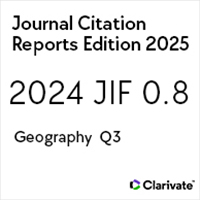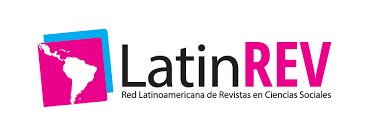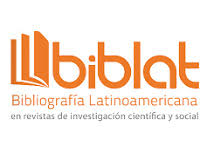Cross-border sanitation project evaluation in Ambos Nogales. Identifying the homogeneous from the diverse
Evaluación del proyecto de saneamiento transfronterizo en Ambos Nogales. Identificando lo homogéneo de lo diverso
https://doi.org/10.21670/ref.2311122
Keywords:
Ambos Nogales, Cross-border sanitation, multiple correspondencesAbstract
This article aims to characterize the Ambos Nogales population according to the opinions of the impacts generated by the expansion and modernization cross-border sanitation system project during 2000-2018 and identify ex post evaluation criteria to strengthen governance strategies for the public policies on water and sanitation. A representative random survey was applied at the city level. The information analysis was performed using the hierarchical cluster and multiple correspondence analysis methods. The results show the formation of groups of cities or population segments with high internal homogeneity and high intergroup heterogeneity. This empirical evidence allows us to build a typology of public opinion. Finally, to improve public opinion on this project, a series of actions aimed at promoting sustainable transboundary governance are proposed.Resumen
Este artículo tiene como objetivo caracterizar a la población de Ambos Nogales en función de sus opiniones sobre los impactos generados por el proyecto de ampliación y evaluación de proyectos de modernización del sistema de saneamiento transfronterizo durante el periodo 2000-2018, para identificar criterios de evaluación ex post que fortalezcan estrategias de gobernanza de políticas públicas en materia de agua y saneamiento. Se aplicó una encuesta aleatoria representativa a nivel ciudad. El análisis de información se realizó mediante el método de conglomerados jerárquicos y el método de análisis de correspondencias múltiples. Los resultados evidencian la conformación de grupos o segmentos de población con alta homogeneidad interna y alta heterogeneidad intergrupal en ambas ciudades, evidencia empírica permite construir una tipología de grupos de población. Como conclusión, se propone una serie de acciones con el objetivo de impulsar una gobernanza transfronteriza y sostenible tendiente a mejorar la opinión pública sobre dicha obra.References
Acemoglu, D. & Robinson, J. A. (2012). Por qué fracasan los países. Los orígenes del poder, la prosperidad y la pobreza. Deusto.
Acta 206 Operación y mantenimiento común del sistema sanitario internacional de Nogales, Comisión Internacional de Límites y Aguas entre México y los Estados Unidos, 13 de enero de 1958, http://www.cila.gob.mx/actas/206.pdf
Aguilar Villanueva, L. F. (2015). Gobernanza y gestión pública. Fondo de Cultura Económica.
Aguilar Villanueva, L. F. & Bustelo Ruesta, M. (2010, diciembre). Gobernanza y evaluación: una relación potencialmente fructífera. Gestión y análisis de políticas públicas, (4), 23-51. https://doi.org/10.24965/gapp.v0i4.437 DOI: https://doi.org/10.24965/gapp.v0i4.437
Alcon, F., Martin-Ortega, J., Berbel, J. & De Miguel, M. D. (2012, febrero). Environmental benefits of reclaimed water: an economic assessment in the context of the Water Framework Directive. Water Policy, 14(1), 148-159. https://doi.org/10.2166/wp.2011.001 DOI: https://doi.org/10.2166/wp.2011.001
Arizona Public Media. (17 de agosto, 2018). Nogales Sewage Pipeline [Video]. YouTube. https://www.youtube.com/watch?v=sWutw16wuJA
Banco de Desarrollo de América del Norte (BDAN). (2004, 30 de julio). Proyecto de rehabilitación del sistema de alcantarillado de Nogales, Sonora. https://www.nadb.org/es/nuestros-proyectos/proyectos-de-infraestructura/proyecto-de-rehabilitacion-del-sistema-de-alcantarillado-de-nogalessonora
Cáñez Cota, A. (2022). Confianza en la gobernanza de aguas transfronterizas México-Estados Unidos: el caso de Tijuana-San Diego. Norteamérica, 17(1), 1-29. https://doi.org/10.22201/cisan.24487228e.2022.1.572 DOI: https://doi.org/10.22201/cisan.24487228e.2022.1.572
Comisión Internacional de Límites y Aguas entre México y los Estados Unidos (CILA). (1944, 3 de noviembre). Tratado entre el gobierno de los Estados Unidos Mexicanos y el gobierno de los Estados Unidos de América de la distribución de las aguas internacionales de los ríos Colorado, Tijuana y Bravo, desde Fort Quitman, Texas, hasta el Golfo de México. http://www.cila.gob.mx/tyc/1944.pdf
Comisión Nacional de los Derechos Humanos (CNDH). (2014). El derecho humano al agua potable y saneamiento. https://www.cndh.org.mx/sites/default/files/documentos/2019-08/Derecho-Humano-Agua-PS.pdf
García, R., Scott, C., Zúñiga, A., Cervera, L., Buechler, S., Peña, S., Muñan, J. & Martínez, K. (2019). Evaluación del impacto transfronterizo de proyectos de infraestructura de saneamiento en Ambos Nogales. Banco de Desarrollo de América del Norte.
Hamilton, A. J., Boland, A.-M., Stevens, D., Kelly, J., Radcliffe, J., Ziehrl, A., Dillon, P. & Paulin, B. (2005). Position of the Australian horticultural industry with respect to the use of reclaimed water. Agricultural Water Management, 71(3), 181-209. https://doi.org/10.1016/j.agwat.2004.11.001 DOI: https://doi.org/10.1016/j.agwat.2004.11.001
Husson, F., Lê, S. & Pagès, J. (2017). Exploratory multivariate analysis by example using R. CRC press. DOI: https://doi.org/10.1201/b21874
Lara Caballero, M. & De León Calderón, A. P. (2018). Análisis y evaluación de políticas públicas. Una reflexión conceptual y metodológica. En M. Lara Caballero & J. J. de la Rosa Rodríguez (Coords.), Análisis y evaluación de políticas públicas en México. Una agenda de investigación (1a. ed. digital, pp. 19-51). UAM.
Li, Q., Wang, W., Jiang, X., Lu, D., Zhang, Y. & Li, J. (2020). Analysis of the potential of reclaimed water utilization in typical inland cities in northwest China via systems dynamics. Journal of Environmental Management, 270, Artículo 110878. https://doi.org/10.1016/j.jenvman.2020.110878 DOI: https://doi.org/10.1016/j.jenvman.2020.110878
Méndez Martínez, J. L. (2020). Políticas públicas. Enfoque estratégico para América Latina. El Colegio de México.
Meranza-Castillón, V., Ruiz-Hernandez, S., Ortiz-Navar, B. & Gutiérrez-Gutiérrez, R. (2017). Impacto de la descarga de agua tratada en la cuenca Los Alisos. Revista de Ciencias Ambientales y Recursos Naturales, 3(19), 18-28. https://www.ecorfan.org/spain/researchjournals/Ciencias_Ambientales_y_Recursos_Naturales/vol3num9/Revista_de_Ciencias_Ambientales_y_Recursos_Naturales_V3_N9_3.pdf
Milenio. (2022, 13 de agosto). Reportan tres personas muertas por fuertes lluvias en Nogales, Sonora [Video]. YouTube. https://www.youtube.com/watch?v=xwKm0G8d5Rw
Norman, L., Villarreal, M., Niraula, R., Meixner, T., Frisvold, G. & Labiosa, W. (2013). Framing scenarios of binational water policy with a tool to visualize, quantify and valuate changes in ecosystem services. Water, 5(3), 852-874. https://doi.org/10.3390/w5030852 DOI: https://doi.org/10.3390/w5030852
Rokeach, M. (1973). The nature of human values. Free press.
Salazar Vargas, C. (2009). La evaluación y el análisis de políticas públicas. Opera, (9), 23-51. https://www.redalyc.org/pdf/675/67515007003.pdf
Scott, C. A., Megdal, S., Oroz, L. A., Callegary, J. & Vandervoet, P. (2012). Effects of climate change and population growth on the transboundary Santa Cruz aquifer. Climate Research, 51(2), 159-170. http://www.jstor.org/stable/24874988 DOI: https://doi.org/10.3354/cr01061
Scott, C. A. & Pineda Pablos, N. (2011, julio). Innovating resource regimes: water, wastewater, and the institutional dynamics of urban hydraulic reach in northwest Mexico. Geoforum, 42(4), 439-450. https://doi.org/10.1016/j.geoforum.2011.02.003 DOI: https://doi.org/10.1016/j.geoforum.2011.02.003
Scott, C. A. & Raschid-Sally, L. (2012). The global commodification of wastewater [Número especial]. Water International, 37(2), 147-155. https://doi.org/10.1080/02508060.2012.662727 DOI: https://doi.org/10.1080/02508060.2012.662727
Tapia Padilla, G. (2005). Aplicación de Modflow para la simulación hidrogeológica estacionaria de una porción de la Cuenca del río Santa Cruz, Sonora, México [Tesis, Universidad de Sonora]. http://www.bidi.uson.mx/TesisIndice.aspx?tesis=6679
Tapia-Villaseñor, E. M., Shamir, E., Megdal, S. B. & Petersen‐Perlman, J. D. (2020). Impacts of variable climate and effluent flows on the transboundary Santa Cruz aquifer. JAWRA Journal of the American Water Resources Association, 56(3), 409-430. https://doi.org/10.1111/1752-1688.12853 DOI: https://doi.org/10.1111/1752-1688.12853
Varady, R. G., Liverman D., Chávez, O., Sánchez, R., Browning-Aiken, A. & Stauber, L. (2019). Asuntos ambientales en la frontera México-Estados Unidos: temas y acciones. En A. Mercado Celis & E. Gutiérrez Romero (Eds.), Fronteras en América del Norte: estudios multidisciplinarios (pp. 279-293). Centro de Investigaciones sobre América del Norte-Universidad Nacional Autónoma de México. https://ru.micisan.unam.mx/bitstream/handle/123456789/20781/L0053_0279.pdf?sequence=1
































